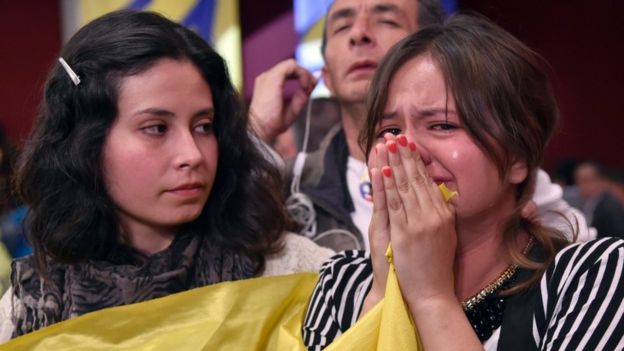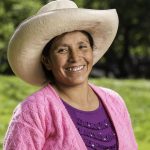This month we have news of the disappointing rejection by the electorate of the peace process in Colombia, the plight of indigenous groups in Brazil and of a new casefile in Peru. And thanks to all who signed the petition asking Brazil to be accountable for the violence committed during the Olympic Games.
COLOMBIA
By the scant margin of 50.2% to 49.8% the Colombian electorate rejected the peace agreement between the government and the FARC rebel guerrillas. This would have ended a civil war that has lasted 52 years.

Amnesty’s Americas Director writes:
“Today will go down in history as the day Colombia turned its back to what could have been an end to a 50-year long conflict that devastated millions of lives.
“Although imperfect, the agreement represented a concrete way forward for peace and justice. The uncertainly this vote brings could place millions of Colombians, particularly those from vulnerable groups such as Indigenous, Afro-descendant and peasant farmer communities at greater risk of suffering human rights violations.
“It’s imperative that Colombia does not walk away from this project and that the country continues to move towards the long awaited peace millions are longing for.”
Amnesty issued the official count of human rights violations in the 52-year conflict:
7.9 million –victims of the armed conflict, almost half of them are women.
6.9 million – victims of forced displacement.
267,000 – conflict-related killings, mostly of civilians.
4,392 –victims of possible extrajudicial executions.
46,386- victims of enforced disappearance.
29,622- kidnappings.
11,062- victims of anti-personnel mines and unexploded ordnance.
8,022 – child soldiers used by paramilitaries and guerrilla groups.
(Note: the detail does not sum 7.9 million, as it excludes other HR violations including torture and threats)
Meanwhile, the killing and death threat of Human Rights defenders continues. At least 35 HR defenders were killed between January and June this year. In August and September there have been 8 further assassinations, including a member of the Afro-descendant community, three members of an NGO working for land rights and four members of an indigenous group. You can download the Amnesty report here.
BRAZIL
Amnesty International Brazil’s petition calling on authorities to end and take accountability for violence committed by security forces during the Olympics was handed in to the Public Security Bureau of the Rio de Janeiro state on September 15th. During the campaign over 210,000 signatures were gathered, thank you to all of you who signed the petition. The hand-in coincides with the release of the report, “A Legacy of Violence: Killings by Police and Repression of Protests at the Rio 2016 Olympics”. The report makes for some bleak reading, detailing examples of repression of protests using rubber bullets, teargas and stun grenades as well as arbitrary detention of protesters, including many under the age of 18.
The UN has warned that the Brazilian Government is failing to recognise the rights of the country’s indigenous peoples and that they are subjected to genocidal violence after seeing first hand their shocking conditions. The UN report noted how they suffer from disease, malnutrition and how communities are routinely attacked and have their leaders killed. Yet, indigenous communities were also praised for their strength and commitment to determine their own futures and way of life. The findings were presented last week in Geneva where several indigenous leaders had travelled to listen to the findings. You can read more on the Survival International’s website.
With over 60 hydro-electric projects in progress or planned in the Amazon basin, the lives of many indigenous peoples are at risk with over 20,000 having already been displaced. The Guardian have released a series of beautiful photos of the Munduruku tribe as they fight for their homes. You can read more about the Amazon tribes and their fight on the Greenpeace website, which also has an action.
PERU

We have reported in the past, and circulated Urgent Actions, about the acts of harassment and physical attacks faced by Máxima Acuña and her family, subsistence farmers in northern Peru; Graham recently sent a link to a video about her. The family have been in a legal dispute for years with the Yanacochamining company over the ownership of a plot of land where they live.
In December 2014 a local Court determined that the family was not guilty of illegally occupying the land, as claimed by the company. The mining company challenged the decision and in March 2015 the Supreme Court confirmed the first acquittal ruling. The mining company is now challenging the ownership of the land in a civil court.
According to her oldest daughter, Máxima Acuña was alone with her husband at home on 18 September when around 20 private security officers from the Yanacocha mining company, along with an unidentified group of people, entered the land where she and her family live and destroyed the crops they were growing for their own use. When Máxima and her husband attempted to stop this, the security personnel used their containment shields and helmets to repress them. Máxima Acuña was taken to the city’s medical centre where medical staff indicated that she was suffering from a variety of injuries as a result of the confrontation. The company claims to have carried out the destruction of the crops in exercise of its ‘possessory right to defence’.
We expect to distribute a new Urgent Action shortly on these developments and are considering adding Máxima Acuña to AIUK’s portfolio of long term cases. She will also feature in this year’s Write for Rights campaign.
With all best wishes,
Your South America Team. Richard Crosfield (Colombia), Ellie May (Brazil), Graham Minter (Rest of South America)